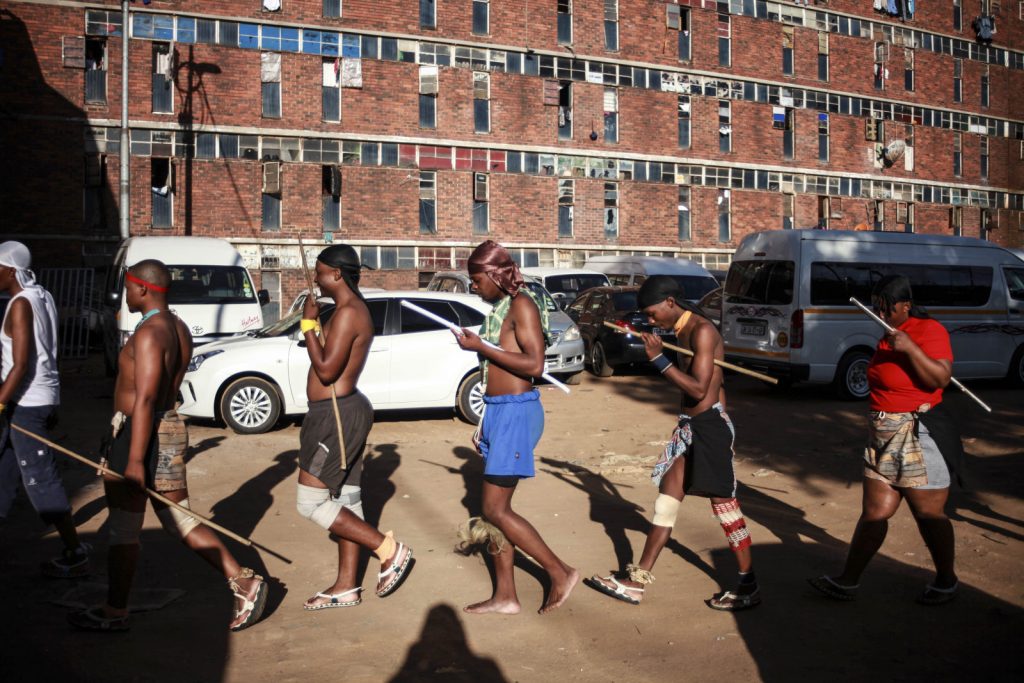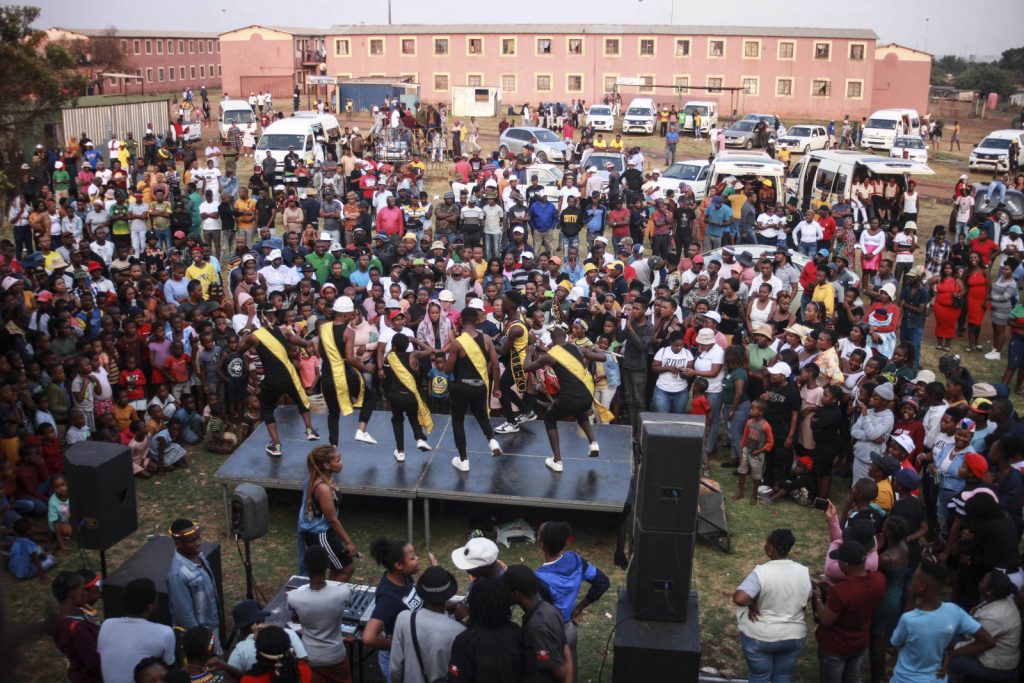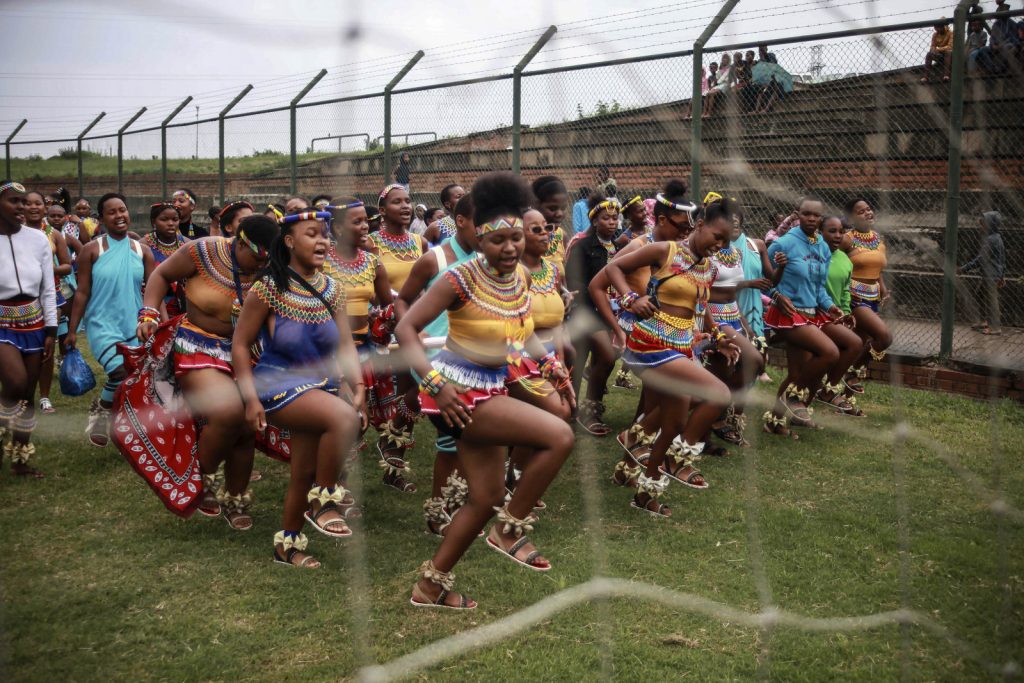Ukhahlamba Zulu Dancers rehearse at the Madala Hostel in Alexandra. Photo: Oupa Nkosi
His Majesty King Misuzulu Sinqobile kaZwelithini was formally recognised on 29 October as the new king of the Zulu nation, the country’s largest ethnic group, after receiving a certificate of appointment from President Cyril Ramaphosa at a ceremony at Moses Mabhida stadium in Durban.
The event, the first coronation since democracy, was attended by thousands of people, including local and foreign dignitaries, and could be said to have ushered in a revival of interest in all things Zulu among other South Africans.
Zulu kings are the descendants of King Shaka kaSenzangakhona, who is respected for uniting more than 11 million Zulu-speaking people, mostly in KwaZulu-Natal and Gauteng.
Zulu culture and heritage, which encompass customs and values such as ubuntu, respect, love and solidarity, were on full display as a strong contingent of male and female regiments, maidens and other cultural groups sang and danced throughout the event which marked a new beginning for the Zulu nation.
Ladysmith Black Mambazo and others have played a pivotal role in teaching the world about South Africa and its culture, particularly Zulu culture.
Two months ago American singer-songwriter John Legend shared a stage with local musician Mthandazo Gayta. This came after Gayta shared a clip of himself singing Legend’s song Nervous in Zulu, which went viral and shot him to internet fame.
Walls are falling
As the most spoken language in the country, the influence of Zulu culture is dominant in townships, workplaces and hostels, which were designed as a cheap way to house migrant workers, invariably stripping them of their dignity, while destroying their family structure in the process.
Township residents tend to view hostels as dangerous and as hiding criminals and hitmen (izinkabi). This perception was exacerbated by the ruthless killings during friction between IFP and ANC supporters pre and post democracy in 1994.
However, the walls designed to demean are slowly falling apart and a new breed of young, talented and hard-working individuals is pushing the boundaries.
“Hostels are very important because our brothers and sisters leave their homes in the rural areas not knowing where they will find accommodation in Johannesburg,” says Mbuyiseni Dumakude, a maskandi singer known as Umqansa.
The 29-year-old from Msinga in KwaZulu-Natal has been living at Buyafuthi hostel in Katlehong, east Johannesburg, since 2014.
Although far from home, it’s easy for him to find assistance and guidance when he wants to perform family rituals as a proud Zulu man.
To fund his music career, he works as a taxi driver by day. On 16 October, he launched his first album, Isimanga Sento, at the hostel with the support of other maskandi artists such as Khuzabani, Masaladi, Mshini, Smomoza and Olalazi.
Some of the performances by the hungrier and more ambitious artists, eager to succeed, were so electrifying that sometimes the makeshift stage felt as if it was going to collapse.
The audience did not disappoint; people came out in numbers to show their support. Fashion was flaunted. Expensive international brands, such as Cutty, Brentwood, Carvela, Nike, Converse, Arbiter, Hugo Boss and Polo were on display.
This reminded me of aboswenka, a group of working-class Zulu men who hosted fashion competitions as a means of displaying wealth and rebelling against apartheid.
“Young kids, especially those who are born and raised in Johannesburg, are inspired to follow in our footsteps when they see us practising our culture,” Umqansa said after his opening performance.
 Ukhahlamba Zulu Dancers rehearse at the Madala Hostel in Alexandra
Ukhahlamba Zulu Dancers rehearse at the Madala Hostel in Alexandra
Glebelands Hostel festival
The Ubunye Bamahostela, an apolitical organisation that advocates for the unity and development of hostels, hosted a spectacular dance festival at the notorious Glebelands hostel in Umlazi last month. The Ingoma Festival aimed to promote peace at KZN hostels.
“Hostels are old and the appalling situation that we live under is not okay. These hostels were built during apartheid and since then they have been forgotten,” said one of the speakers addressing the large crowd.
“We are hosting this event here at Glebelands to show our solidarity and support with the residents of this hostel. Ten years ago, the hostel was engulfed in violence where a lot of people lost their lives. We hope this event will bring peace and unity to them,” said spokesperson Steve Mthembeni Thusi.
The colourful, joyous event celebrated different cultures and tribes with dance and singing.
 Maskandi band Abenkululeko at Buyafuthi Hostel in Katlehong. Photo: Oupa Nkosi
Maskandi band Abenkululeko at Buyafuthi Hostel in Katlehong. Photo: Oupa Nkosi
Indishi events
Another phenomenon taking Gauteng hostels by storm is the Indishi events. They are aimed at building social cohesion and raising funds for young women, who are transitioning to adulthood.
Umshawudi is a person chosen to preside over an event, who collects money, notes not coins, from men in a crowd who wish to request the attention of one of the participating women who has caught his eye.
“It is a cordial game between men and young women, where men contest with each other about how much they are willing to part with in order to get attention or even a friendly kiss on a cheek,” says Amaciko Wendalo founder and lead singer Xolani Ntuli, known on stage as Shumbelimboxo.
“With the money raised, a family is able to buy cattle to be slaughtered when the young woman undergoes a rite of passage ceremony or is able to further her education”.
Ntuli from Nkandla came with his mother to Joburg in early 2000 and has lived in various hostels in search of a better life. Through hard work the maskandi singer has managed to release three albums and buy his family a house in Germiston.
Comfort in Zulu dance
The Ukhahamba Zulu Dancers from Madala hostel in Alexandra, Joburg, was formed in 1997 by Philani Makhaza, who was exposed to dance from childhood when his bricklayer father, who worked all his life in the City of Gold, was an igosa — a group dance leader — in KwaZulu-Natal. The group has performed at the Dubai Festival, competed in many parts of the country and won numerous competitions and awards.
 Izintombi ZikaGog’ Mthombela at the Ingoma Festival at Glebelands. Photo: Oupa Nkosi
Izintombi ZikaGog’ Mthombela at the Ingoma Festival at Glebelands. Photo: Oupa Nkosi
… And one white saviour
The late Johnny Clegg came to represent one of the most well-known culture-crossers. As a white man whose family hailed from Zimbabwe, he embraced — or is that appropriated? — Zulu dance and music, translating his fascination into a decades-long successful international career, as well as arguably boosting the international profile of the band members of Juluka, particularly Sipho Mchunu, and later Savuka.
He was engrossed in Zulu culture, which he embraced “and it embraced him”, according to his son Jaron Clegg during the webinar to launch his father’s autobiography Scatterling of Africa in October.
In a video shot in 2014, at an end-of-the-year event at Jeppe hostel, Clegg is seen dancing impressively, as if possessed by spirits, while Zulu men, clap their hands rhythmically to the beat of a drum.